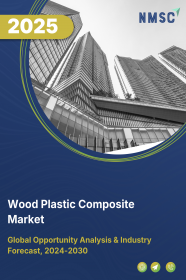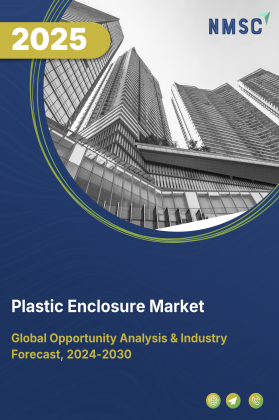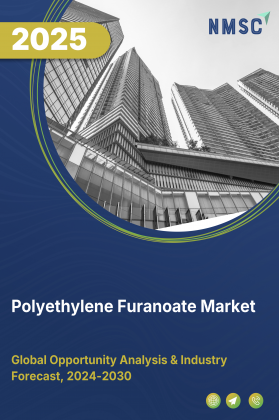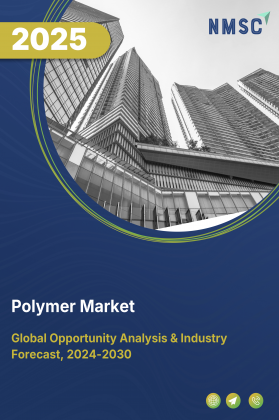
Wood Plastic Composite Market by Material Type, (Polyethylene HDPE, Polyethylene LDPE, Polypropylene, Polyvinyl Chloride PVC, Polystyrene, Acrylonitrile Butadiene Styrene ABS, Polylactic Acid PLA and Other Bio-based Polymers, Recycled Polymer Blends, Other Engineering Polymers), by Product Form, (Profiles, Boards and Sheets, Pellets and Granules, Molded Components, Panel Systems), by Manufacturing Process, (Extrusion,and others) – Global Opportunity Analysis and Industry Forecast 2025-2030
Wood Plastic Composite Market Overview
The global Wood Plastic Composite Market size was valued at USD 8.39 billion in 2024 and is predicted to reach USD 14.81 billion by 2030 with a CAGR of 10.5% from 2025-2030.
The factors such as rise in construction activities, growing demand for automotive vehicles and mankind inclination towards bio-degradable usage boosts the market expansion. However, high cost of WPC products hinders the market growth. On the contrary, integration of nanotechnology chipset implementation creates future opportunities.
Rise in Construction Activities Boosts the Market Demand
The increase in rate of construction for decking, rallying, fencing, and cladding in various construction activities propels the market growth. According to a World Bank report in 2023, the global construction industry is emerging with a revenue generation of about USD 27.76 trillion in 2023. Wood plastic composite includes resistant ability toward decay, rot, and pest attacks, making it more ideal and better alternative to conventional wood and plastic for usage in construction purposes. The increase in construction activity, therefore, increases the need for WPC to provide greater durability and enhanced appearance on architectural structures.
Rise In Demand for Automotive Vehicles Boosts the Market Trends
The growing automotive sector increases the demand for durable, lightweight, and sustainable materials used for manufacturing parts of the automobile benefitting global industry growth. As per the reports published in Our World, 2023, automotive sales grown from about 72.87 million units in 2022 to approximately 76.67 million units in 2023, causing an increase of nearly 5.2% in world sales. The making of diverse interior and exterior components of the automobile such as dashboards, door panels, and trims employs WPCs. It poses great durability and resistance to moisture, thermal shock, and wear.
Mankind Inclination Towards Sustainable Product Usage
The growth of the market for green alternatives is significantly driven by strict government regulations against deforestation, as established by various regulatory bodies. According to reports published by, the UN General Assembly, 2024, United Nations Strategic Plan for Forests 2017-2030, is intended to increase the forest area by 3% across the globe by 2030, with six global forest goals and generally indicates an increase of 120 million hectares. Wood plastic composites are produced from wood fiber waste and plastics such as recycled polyethylene or polypropylene rendering zero utilization for natural wood. Hence, the industrial sectors are looking at WPC as a substitute for natural wood products, thereby lessening the desires of timber from forests and creating a boost for the market.
High cost of WPC hinders market expansion
Wood plastic composites (WPCs) are manufactured at a high cost compared to traditional materials based on wood or plastic, therefore inhibiting their growth. WPC processing and production involve special equipment and technology, which increases costs even further. These high costs deter manufacturers and consumers from adopting WPCs, obstructing market growth.
Nanotechnology Usage Unlocks Opportunity for the Industry Development
Nanotechnology is expected to precipitate a flurry of opportunities in the WPC market with the introduction of various accessibility properties such as durability, self-cleaning, and antimicrobial activity. These properties improve the performance and even the durability of WPC while also addressing high-maintenance consumer demand for quality construction materials.
Market Segmentation and Scope of the Study
The WPC market report is segmented on the basis of type, manufacturing process, end users, and region. On the basis of type, the market is divided into polyethylene, polyvinylchloride, polypropylene, and others. On the basis of manufacturing process, the market is divided into below extrusion process, compression molding process, and injection molding process. On the basis of end users, the market is divided into commercial, residential, and industrial. Regional breakdown and analysis of each of the aforesaid segments include regions comprising North America, Europe, Asia-Pacific, and RoW.
Geographical Analysis
North America dominants the wood plastic composite market share and is anticipated to retain its position during the entire forecast period. It is the reason that the construction industry is gigantic inside the U.S. and Canada, and pushes the demand for hard and durable materials against extreme conditions with endurance over time. The latest report on the US construction industry mentions that construction, with more than 919,000 establishments for Q1 2023, significantly contributes to the U.S. economy. This growth of the construction industry in the region propels the demand for WPC, which is decay- and pest-free, enabling its application for construction projects.
Moreover, the market growth is further propelled by stringent regulations regarding commercial environmental protection in the region that mandate the use of sustainable and eco-friendly materials. For example, the Environmental Protection Law in Canada, states that natural resources such as forestry must be protected, and any substance whose release into the environment alone or in combination causes environmental damage must be eliminated. WPC is made using recycled wood fibers that help reduce the demand for forest-based wood and reduce pressure on natural forests.
Meanwhile, the Asia-Pacific region is expected to experience steady growth in the wood plastic composite market over the forecast period. The rise of materials that withstand wearing, moistures & climate factors for final durability & product longevity is due to the growing development in the expanding furniture industry in countries such as China and India. According to the India Brand Equity Foundation Report, the Indian furniture market was estimated around USD 23.12 billion in 2022, to increase around USD 32.7 billion by 2026. Increasing demand in furniture sides comes into focus for WPC since it stands against rotting, decaying, & insect damage and is widely acceptable for outdoor furniture as well as areas needing high durability.
Furthermore, the automotive industry, being on the rise in the region, further accelerate the need for WPC materials comprising lightweight, durable, and eco-friendly properties. According to reports published by International Trade Administration Report, 2023, China is the largest automobile market at global level regarding production and sales, with expected domestic production increasing by around 35 million vehicles by 2025. WPC finds application in the automotive field in interior components namely door panels, dashboard trims, centre consoles, and seatbacks. The enlargement of the automotive sector in the region boosts market growth, due to the lightweight property of WPCs that reduces the overall weight of the automobile vehicles, thereby, enhancing its fuel efficiency and handling.
Competitive Landscape
The sustainable building materials market comprises of various market players such as Trex Company, Inc, UFP Industries, Inc, CertainTeed LLC, Fiberon LLC, AZEK Building Products, Beologic NV, JELU-WERK J. Ehrler GmbH And Co. KG, Polyplank AB, Green Dot Bioplastics Inc, FKuR Kunststoff GmbH, Guangzhou Kindwood Co. Ltd, TAMKO Building Products LLC, Advanced Environmental Recycling Technologies LLC, Oakio Plastic Wood Building Materials Co. Ltd, RENOLIT SE, Technaro GmbH, Anhui Guofeng Co., Ltd, Seven Trust Co., Ltd, Weihai Hongda Wood Plastic Technology, Emirates Composite Materials Company and others. These market players are adopting strategies such as product launch to stay competitive and maintain their market positions.
For instance, in September 2022Fiberon LLCDuring this scan, I was unable to locate a recent, high-confidence public announcement or press release specific to Fiberon in the WPC area for 2024–2025.
Key Benefits
-
The report provides quantitative analysis and estimations of the composite decking market from 2025 to 2030, which assists in identifying the prevailing industry opportunities.
-
The study comprises a deep dive analysis of the current and trends wood plastic composite market trends to depict prevalent investment pockets in the industry.
-
Information related to key drivers, restraints, and opportunities and their impact on the wood plastic composite market trend is provided in the report.
-
Competitive analysis of the key players, along with their market share is provided in the report.
-
SWOT analysis and Porters Five Forces model is elaborated on the study.
-
Value chain analysis in the market study provides a clear picture of roles of stakeholders.
Wood Plastic Composite Market Key Segments
By Material Type
-
Polyethylene HDPE
-
Polyethylene LDPE
-
Polypropylene
-
Polyvinyl Chloride PVC
-
Polystyrene
-
Acrylonitrile Butadiene Styrene ABS
-
Polylactic Acid PLA and Other Bio-based Polymers
-
Recycled Polymer Blends
-
Other Engineering Polymers
By Product Form
-
Profiles
-
Decking Boards
-
Railing and Baluster Profiles
-
Fencing Profiles
-
Cladding Profiles
-
-
Boards and Sheets
-
Structural Boards
-
Decorative Panels
-
-
Pellets and Granules
-
Extrusion Grade Pellets
-
Injection Molding Grade Pellets
-
-
Molded Components
-
Furniture Components
-
Automotive Interior Components
-
Small Consumer Molded Parts
-
-
Panel Systems
-
Sandwich Panels
-
Laminated Panels
-
By Manufacturing Process
-
Extrusion
-
Profile Extrusion
-
Co-extrusion
-
-
Injection Molding
-
Compression Molding and Hot Press
-
Compounding and Pelletizing
-
Lamination and Panel Assembly
By Product Construction
-
Solid Profiles
-
Hollow Profiles
-
Foamed Profiles
-
Sandwich Construction
By Wood And Filler Source
-
Wood Flour and Fiber
-
Softwood Derived
-
Hardwood Derived
-
-
Agricultural Residues
-
Rice Husk
-
Bamboo Fiber
-
Straw and Other Residues
-
-
Recycled Wood and Wood Waste
-
Mineral Fillers
By Wood Content Level
-
High Wood Content (>50%)
-
Medium Wood Content (25-50%)
-
Low Wood Content (<25%)
By Application And End Use
-
Building and Construction
-
Residential Decking and Railing
-
Commercial Decking and Public Area Decking
-
Cladding and Siding
-
Window and Door Frames
-
Interior Floor and Wall Panels
-
-
Outdoor Infrastructure and Landscaping
-
Fencing Pergolas Boardwalks and Docks
-
Benches and Public Furniture
-
-
Furniture
-
Outdoor Furniture
-
Indoor Furniture Components
-
-
Transportation and Automotive
-
Interior Trim Panels
-
Non-structural Components
-
-
Industrial and Packaging
-
Consumer Goods and Other Specialty
-
Small Molded Consumer Parts
-
Acoustic and Barrier Panels
-
By Distribution Channel
-
OEM and Contract Manufacturing
-
Distributors and Wholesalers
-
Contractors and Fabricators
-
Retail and E-commerce
-
Direct to Consumer Brands
By Feedstock
-
Virgin Polymer Feedstock
-
Recycled Polymer Feedstock
-
Bio-based Polymer Feedstock
-
Certified Recycled Wood Feedstock
By Price Tier
-
Premium Grade
-
Mid-market Grade
-
Economy Grade
By Region
-
North America
-
The U.S.
-
Canada
-
Mexico
-
-
Europe
-
The UK
-
Germany
-
France
-
Italy
-
Spain
-
Denmark
-
Netherlands
-
Finland
-
Sweden
-
Norway
-
Russia
-
Rest of Europe
-
-
Asia Pacific
-
China
-
Japan
-
India
-
South Korea
-
Australia
-
Indonesia
-
Singapore
-
Taiwan
-
Thailand
-
Rest of Asia Pacific
-
-
RoW
-
Latin America
-
Middle East
-
Africa
-
Key Players
-
Trex Company, Inc.
-
UFP Industries, Inc.
-
CertainTeed LLC
-
Fiberon LLC
-
AZEK Building Products
-
Beologic NV
-
JELU-WERK J. Ehrler GmbH And Co. KG
-
Polyplank AB
-
Green Dot Bioplastics Inc.
-
FKuR Kunststoff GmbH
-
Guangzhou Kindwood Co. Ltd.
-
TAMKO Building Products LLC
-
Advanced Environmental Recycling Technologies LLC
-
Oakio Plastic Wood Building Materials Co. Ltd.
-
RENOLIT SE
-
Technaro GmbH
-
Anhui Guofeng Co., Ltd.
-
Seven Trust Co., Ltd.
-
Weihai Hongda Wood Plastic Technology
-
Emirates Composite Materials Company
Report Scope and Segmentation
|
Parameters |
Details |
|
Market Size in 2024 |
USD 8.39 billion |
|
Revenue Forecast in 2030 |
USD 14.81 billion |
|
Growth Rate |
CAGR of 10.5% from 2025 to 2030 |
|
Analysis Period |
2024–2030 |
|
Base Year Considered |
2024 |
|
Forecast Period |
2025–2030 |
|
Market Size Estimation |
Billion (USD) |
|
Growth Factors |
|
|
Countries Covered |
28 |
|
Companies Profiled |
20 |
|
Market Share |
Available for 10 companies |
|
Customization Scope |
Free customization (equivalent up to 80 working hours of analysts) after purchase. Addition or alteration to country, regional, and segment scope. |
|
Pricing and Purchase Options |
Avail customized purchase options to meet your exact research needs. |

















 Speak to Our Analyst
Speak to Our Analyst





















